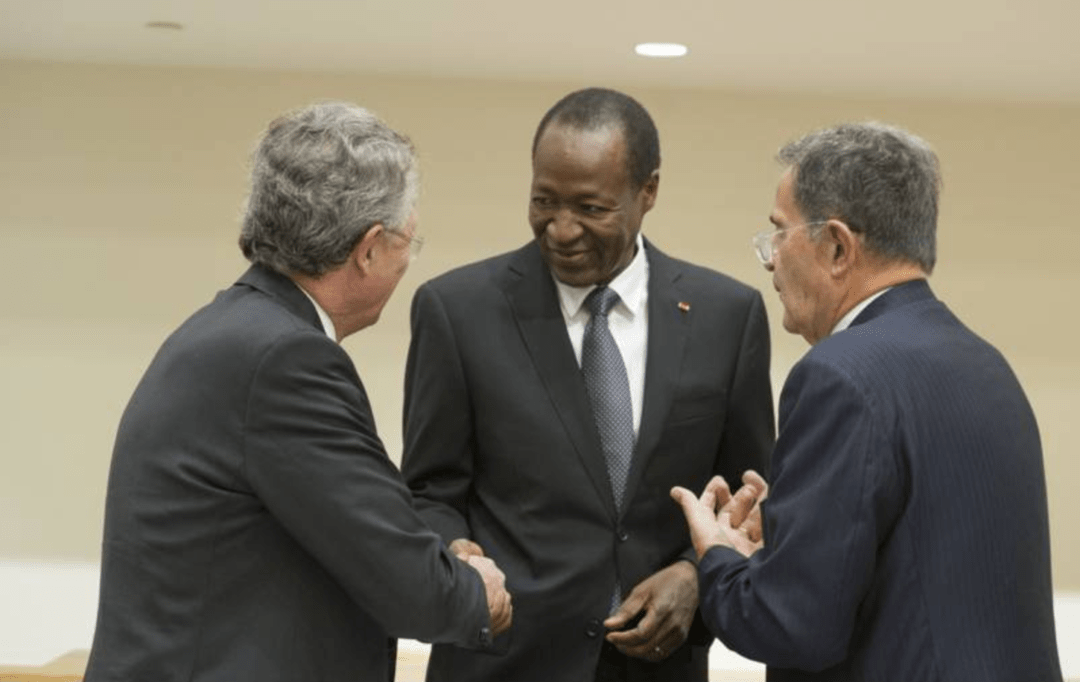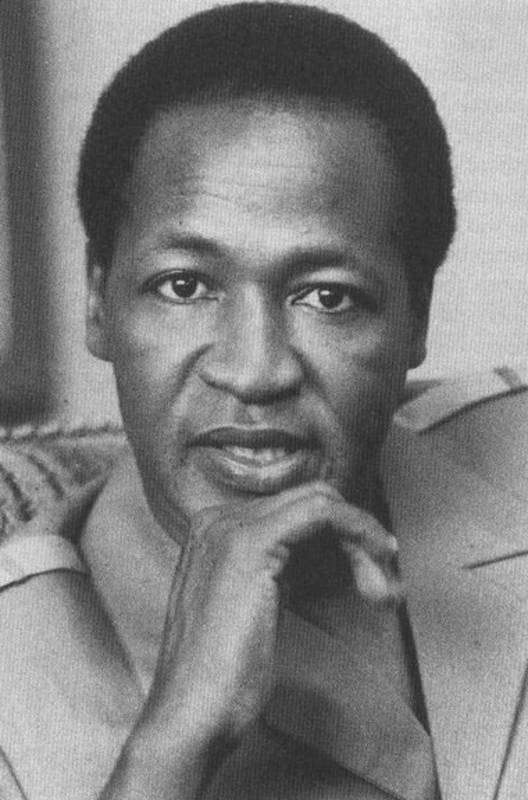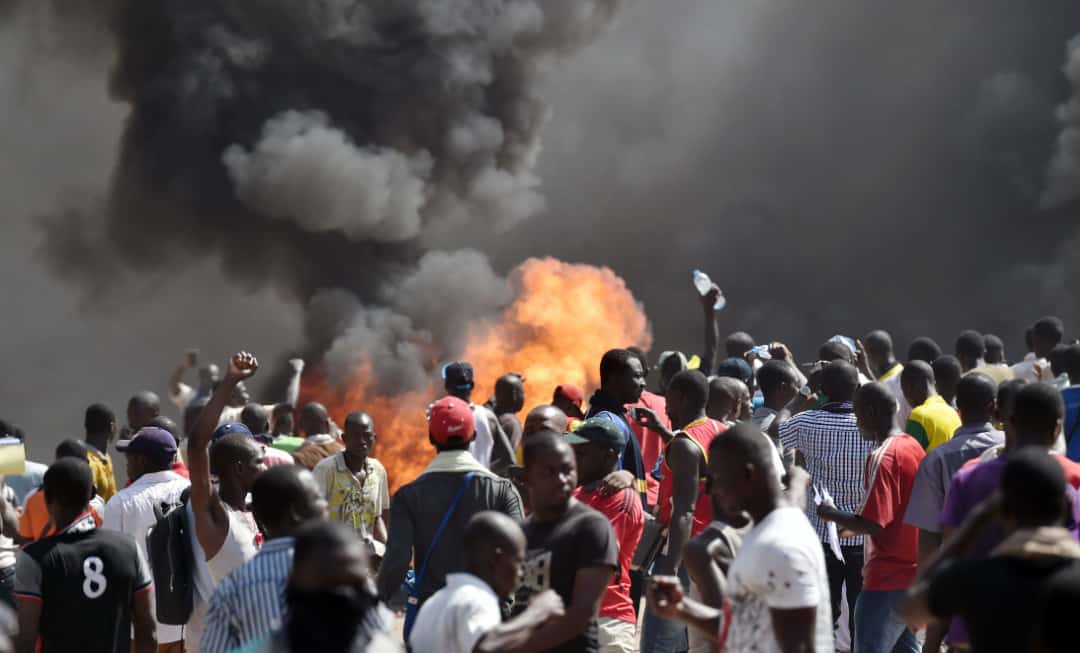Blaise Compaoré is a Burkinabè stateman, born on February 3, 1951 in Ouagadougou, who was Burkina Faso’s sixth president from 1987 to 2014. Compaoré was a key mediator of conflicts in the African region on behalf of the United Nations (U.N.), African Union (A.U.) and ECOWAS from 1998 to 2014 (1).
Compaoré first came to power in a military coup on October 15, 1987. During his first years in power, Compaoré was often regarded as both a regional strongman and by some as a regional troublemaker. Compaoré’s image in the international community evolved from that of a military ruler to a figure widely recognized as a respected regional peacekeeper and conflict mediator (2).
Compaoré’s impressive track record of diplomatic, economic and social achievements earned him praise from many quarters (3), – including from the UN Secretary General, then Ban Ki-moon (4), the U.S. Secretary of State, then John Kerry (5) and late Nobel Peace Prize winner Elie Wiesel (6).
Building a multiparty democratic system
He was elected President by direct universal suffrage in 1991(7). The presidential as well as legislative elections held between 1991 and 2012, were never challenged by the international community: International Crisis Group (8) and considered peaceful and relatively free: Freedom House (9).
Compaoré was the first president since the country’s independence to install a climate of genuine political opening up (10). Burkina Faso’s press freedom was ranked by Reporters without Borders as one of Africa’s best, overtaking even the Unites States in 2014 (11). He also implemented far going decentralization with high performing local institutions reducing poverty and inequality, becoming a model to be followed according to the World Bank’s 1999 Policy Research Working Paper (12).
Bringing enduring political stability to his country, is one of Compaoré’s major achievements – something his predecessors had never achieved 2014: International Crisis Group (13).

President Compaoré (right) presiding the U.N. Security Council meeting and U.N. Secretary Ban Ki-moon ( left), New York, September 23, 2008
Track-record of social and economic achievements
Once an army captain and officer in the airborne force, Compaoré earned praise for efforts outside the area of security – he considered the endemic poverty of Burkina as his #1 enemy. Poverty decreased by 30% during his presidency: IMF (14). It even decreased by 14 % in the final five years of his presidency: Oxfam (15).
Important social gains were recorded in a number of metrics. Starting in 1991 with one of the world’s lowest net school enrollment levels, Burkina earned international praise when it seemed to be on track to achieve universal primary education by 2016, with an enrolment of 92.8% in 2013 (compared to 41.1% in 1998) (16).
Public investment in transport, energy and water resources reached an average growth rate of more than 20% between 1999 and 2009 (17). Burkina Faso was ranked as the No.1 African leader and among the Top 15 of developing countries worldwide in 2010, in terms of progress on reaching the U.N. Millennium Development Goals (MDGs) (18)

With Romano Prodi, former president of the European Union Commission (right) and another top official of the European Union, Brussels, April 2014
Regarding Female Genital Mutilation (FGM) thanks to the leadership of President Compaoré and his spouse Chantal, Burkina Faso has proved it can annihilate this practice within a span of one generation (19). Subsidies for child birth and obstetrics services and free natal counselling cut maternal mortality by 30% between 2005 and 2014 (20). Compaoré has also personally promoted HIV/ AIDS programs (21). Prevalence of HIV/Aids which reached 7.2% in 1997 had fallen to 2 % in 2006 and below 1 % since 2012 until his departure (22).
Africa’s conflict mediator
Mandated by the United Nations, African Union and/or ECOWAS in several conflicts in Darfur (23), Côte d’Ivoire (24), Mali (25), Guinea (26), The Central African Republic (27), Niger (28), Togo (29), Liberia (30) and Chad (31) among others, Compaoré’s mediation successes made Burkina Faso emerge as a major regional and international partner in resolving crisis in the African region – hence acquiring substantial new political stature and yielding important economic gains for the country (32).
While he was leader of the Organisation of African Unity in 1998, Compaoré contributed to the resolution of the Eritrea-Ethiopia conflict (33) and his intervention with Libya lifted the international embargo imposed on the latter by the international community.
His arrival to power
 But Compaoré didn’t start out as a mediator. He entered the political arena as a game changer. On August 4, 1983, the then-captain Blaise Compaoré seized control of the capital city with his elite military units and installed his fellow, captain Thomas Sankara as President of the National Council of the Revolution (1983-1987) (34). Together Sankara and Compaoré led an aggressive Marxist-Leninist inspired effort to uplift the country (35).
But Compaoré didn’t start out as a mediator. He entered the political arena as a game changer. On August 4, 1983, the then-captain Blaise Compaoré seized control of the capital city with his elite military units and installed his fellow, captain Thomas Sankara as President of the National Council of the Revolution (1983-1987) (34). Together Sankara and Compaoré led an aggressive Marxist-Leninist inspired effort to uplift the country (35).
But amidst growing militarization and escalating repression and with social tensions at its peak (36), the relationship between the two leaders eventually deteriorated. Soon clashes started also within the military that got dangerously divided in two camps by 1987. On October 15, 1987, during a lethal shout out between two opposite camps of communist militaries, President Sankara was killed (37). Perhaps after he had told soldiers loyal to him to eliminate his supposed ally: The Economist (38). Each side blamed the other and a long enduring controversy began that libeled Compaoré’s image (39).
Compaoré who had been the second-in command of the National Committee of the Revolution, took over the country and rectified the Revolution (40); he disarmed without delay the Committees in Defense of the Revolution, a civilian militia accused of severe human rights abuses (41). Compaoré invited everyone without exception to participate in the creation of political parties (42) and enlisted their participation in efforts to draft a new Constitution which was adopted by referendum on June 2, 1991 (43).
Elected President by direct universal suffrage in 1991, Blaise Compaoré presided over the only period of stability and economic growth in the post-colonial history of the country (44). The GDP grew with an average of 6% since 2004 until his departure on October 31, 2014 (45).
His departure
His presidency came abruptly to an end with his resignation on October 31, 2014 (46). His exit was clearly linked to Compaoré’s legal effort to lift the constitutional bar on his seeking a fifth term in office. As the International Business Times wrote “Compaoré, one of Africa’s longest-serving leaders, was largely popular until he attempted to change the constitution to extend his rule” (47). Violent protests followed the announcement of a parliamentary vote on this issue. Compaoré authorized all manifestations from the beginning on October 21 until the curfew on October 30, 2014 when mobilized crowds started looting the burned-down parliament and streets of Ouagadougou (48).
Within the span of less than a week, Burkina Faso went through a popular revolution against a democratically elected leader, a military coup and a subsequent power struggle within a military junta – reminiscent of unstable times prior to the Compaoré era: The Economist (49).
As the French newpaper Le Monde concluded “For three decades, Compaoré was one of Africa’s most influential men” (50).

